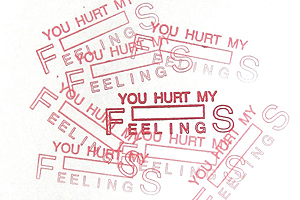Examination of emotion: Scholars to explore political feelings
By Josh SchonwaldNews Office
 | |
As the U.S. presidential campaign heats up—as supporters line up behind candidates and organize around the issues—emotions will inevitably heighten. Streams and floods of rage and hope and rushes of optimism will bond strangers in solidarity.
Why is this? Why does political life make people so hot under the collar during election season or as a daily obsession? How does emotion, as opposed to policy debate, govern discussions about crisis or perceived threats to a way of life—for example, in the debate over gay marriage or after natural disasters such as Hurricane Katrina?
A conference this weekend at the University’s Franke Institute for the Humanities, co-organized by Lauren Berlant, the George M. Pullman Professor in English Language & Literature and Director of the Lesbian and Gay Studies Project of the Center for Gender Studies, will explore one of the crucial elements in the upcoming campaign season and in public life in general: the role of feelings.
Scheduled for Friday, Oct. 19 and Saturday, Oct. 20, the conference is titled “Anxiety, Urgency, Outrage, Hope É A Conference on Political Feeling.” It will bring together a diverse group of scholars, artists and activists, who are engaged in a wide range of scholarly writing, and visual art and film, to examine the role that feelings play in politics, social belonging, and intimacies among intimates and strangers.
“It’s a conference that asks us about the feelings that bind and repulse us,” said Berlant. “People are increasingly interested in thinking about ways in which feelings and affect mediate the world,” said Berlant, “and in the way that thinking about feeling changes how intellectuals understand their objects of analysis.”
The aim of the two-day conference, said Berlant, “is to think about the political as a space of affective and emotional disruption and attachment in the United States, and to think of the orchestration of emotion as central to the organization of politics and all of the lives affected by politics.”
The conference will showcase the work of the “Public Feelings” group, a loosely aligned collective of scholars, based in Chicago, New York and Austin, Texas. Berlant instigated the formation of the group about four years ago. The Chicago group refers to itself as a “feel tank rather than a think tank,” and it opposes the splitting of thinking and feeling in both academic scholarship and political activism.
Feel Tank Chicago is perhaps best known for addressing feelings of apathy and depression in public political culture by sponsoring the “Annual International Parades of the Politically Depressed.” The slogan for the event, at which demonstrators show up in their bathrobes and slippers, is “Depressed? It might be Political.”
While the conference will focus heavily on public, political culture, Berlant said, it also will explore the role of affect and feeling in a variety of contexts.
The first day of the conference will begin at 9:30 a.m. with an introductory session on the varieties of political feeling.
At 11 a.m., Ruth Wilson Gilmore, of the University of Southern California, will present a paper titled, “Tossed Overboard: Katrina, Abandonment and the Infrastructure of Feeling,” which will examine the emotional aftermath of Hurricane Katrina.
At 2 p.m., an afternoon session titled “Beyond Hopeless” will feature the presentation of “Black Optimism,” a paper by Duke University’s Fred Moten, and “Dialectics of Hope and Hopelessness,” which Lisa Duggan and Jose Munoz of New York University will present.
In the evening Friday, Oct. 19, the conference will shift to the Film Studies Center for a film screening (see film calendar listings, Page 6) and a conversation with video artist Beatriz Santiago Munoz and documentary filmmaker Carel Rowe.
The conference will reconvene at 10 a.m. Saturday, Oct. 20, for “Public Feelings at Work,” a collaborative panel with Austin, Texas, members of the Public Feelings group. During the afternoon session, “Forming, Shifting and Fracturing Solidarities,” Rebecca Zorach, Associate Professor in Art History and a Feel Tank Chicago member, will present “Invitation to Discomfort.” At 3:15 p.m., Berlant and Ann Cvetkovich, of the University of Texas at Austin, will engage in a conversation on the subject of “Pedagogies of Feeling.”
The conference will conclude at 4:30 p.m. at the Franke Institute for the Humanities with a screening of Jeffrey Skoller’s 30-minute film, The Promise of Happiness, which explores modern-day social utopian thinking.
For more information on the conference, which is co-sponsored by the Center for Gender Studies, the Lesbian and Gay Studies Project of the Center for Gender Studies, the Department of Visual Arts and the Franke Institute for the Humanities, please visit the conference Web site at: http://politicalfeeling.uchicago.edu.
![[Chronicle]](/images/sidebar_header_oct06.gif)